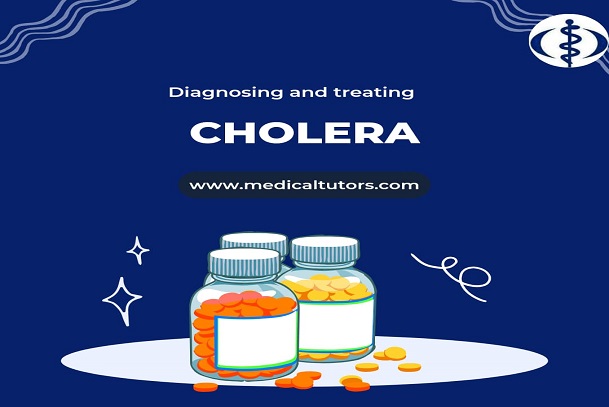 Wash your hands regularly and wear a face mask.
Learn more
Wash your hands regularly and wear a face mask.
Learn more

Diagnosing Cholera
It is almost impossible to differentiate between a patient who has cholera, from patients who have other forms of acute watery diarrhea, without testing a stool sample. Reviewing multiple patients who are part of a suspected outbreak of acute watery diarrhea can help in identifying cholera because of the rapid spread of the disease.
The presence of Vibrio Cholerae in stools is confirmed through laboratory testing. However, new rapid diagnostic tests (RDT) are available, allowing quick testing at the patient’s bedside which have been approved by the World Health Organization (WHO). These rapid cholera diagnostic tests enable doctors in remote areas to quickly confirm a cholera diagnosis. Quick confirmation leads to earlier public health interventions for outbreak control and helps to decrease death rates at the start of cholera outbreaks.
Also, WHO suggests that all samples that tested positive with the RDT should be re-tested at the laboratory for proper confirmation.
Treatment of Cholera
Cholera is an easily treatable disease. Most people (90%) that are infected with cholera usually have mild diarrhea or no symptoms at all.
Treating cholera may require any of the following methods:
Rehydration Therapy
Cholera can cause dehydration, and without treatment can lead to a case-fatality rate, for severe cholera, of about 50%. However, with timely rehydration therapy i.e., replacing fluids as fast as they are being lost, treatment is very effective and simple and more than 99% of cholera patients will survive. That’s why rehydration is the most important treatment for cholera.
The degree of dehydration guides the therapy of the patient. A patient with severe dehydration requires emergency intravenous polyelectrolyte solution for rehydration followed by oral rehydration salts solution (ORS) to maintain stable hydration levels. The ORS solution is available as a powder that can be made with bottled water or water which has been boiled and cooled to room temperature For milder cases, ORS is used for both rehydration and maintenance.
The WHO/UNICEF ORS standard sachet is dissolved in 1 liter (L) of clean water. Adult patients may require up to 6 L of ORS to treat moderate dehydration on the first day.
Patients who are severely dehydrated require intravenous fluids. For example, a 50 kg patient with severe dehydration will need immediate replacement of 5 L of intravenous fluids. Patients who have very weak pulse or blood pressure should receive the fluid as rapidly as possible and more than one intravenous line may be needed to infuse the fluid rapidly enough to restore the pulse. The entire amount should be given between 2–4 hrs.
The most common error in the treatment of cholera is to give the intravenous fluid too slowly, thus, allowing patients to remain in shock for a long period of time.
Antibiotics Treatment
In line with hydration, treatment with antibiotics is recommended for patients who are severely ill. It is also recommended for patients who have severe dehydration as they continue to pass a large volume of stool even during rehydration treatment. Antibiotics are also recommended for all pregnant women and patients with comorbidities (e.g., severe acute malnutrition, HIV infection).
Antibiotics are given as soon as the patient can tolerate oral medication. In most countries, doxycycline is recommended as a first-line treatment for adults (including pregnant women) and children. For pregnant women, young children and those resistant to doxycycline, oral medication like azithromycin or ciprofloxacin are alternative options.
During an epidemic or outbreak, antibiotic susceptibility should be monitored through regular testing of sample isolates from various geographic areas.
It should be noted that none of these recommended antibiotics should be used as prophylaxis for cholera prevention, and all emphasize that antibiotics should be used in conjunction with aggressive rehydration.
Zinc Supplements
Research has shown that zinc might decrease diarrhea and shorten how long it lasts in children with cholera.
It is an important adjunctive therapy for children under the age of 5 years, which also reduces the duration of diarrhea and may prevent future episodes of other causes of acute watery diarrhea.
Breastfeeding
Breastfeeding children exclusively should be promoted among mothers to prevent cholera in such children.